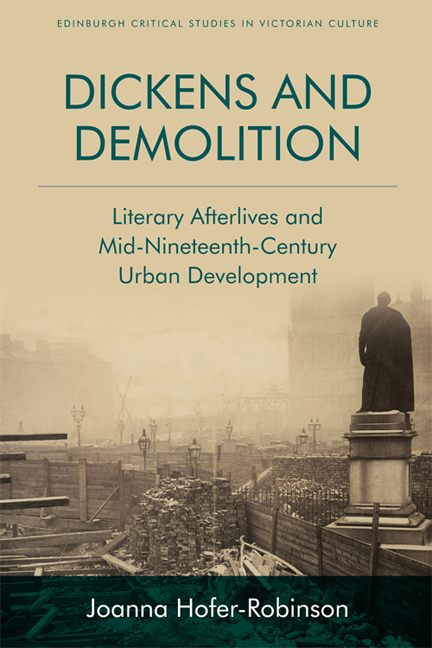Book contents
- Frontmatter
- Contents
- List of Illustration
- Acknowledgements
- Series Editor’s Preface
- Abbreviations and a Note on Editions
- Dedication
- Introduction
- 1 Charles Dickens and Metropolitan Improvements
- 2 Sets and the City: Staging London and Oliver Twist
- 3 Dickensian Afterlives and the Demolition of Field Lane
- 4 Paperwork and Philanthropy: Dickens’s Involvement in Metropolitan Improvement
- 5 From Sanit ary Reform to Cultural Memory: The Case of Jacob’s Island
- Coda
- Archival Sources and a Note on Method
- Select Bibliography
- Index
- Plate Section
Coda
Published online by Cambridge University Press: 29 April 2021
- Frontmatter
- Contents
- List of Illustration
- Acknowledgements
- Series Editor’s Preface
- Abbreviations and a Note on Editions
- Dedication
- Introduction
- 1 Charles Dickens and Metropolitan Improvements
- 2 Sets and the City: Staging London and Oliver Twist
- 3 Dickensian Afterlives and the Demolition of Field Lane
- 4 Paperwork and Philanthropy: Dickens’s Involvement in Metropolitan Improvement
- 5 From Sanit ary Reform to Cultural Memory: The Case of Jacob’s Island
- Coda
- Archival Sources and a Note on Method
- Select Bibliography
- Index
- Plate Section
Summary
In former times great objects were attained by great work. When evils were to be reformed, reformers set about their heavy task with grave decorum and laborious argument. […] We get on now with a lighter step, and quicker: ridicule is found to be more convincing than argument, imaginary agonies touch more than true sorrows, and monthly novels convince, when learned quartos fail to do so. If the world is to be set right, the work will be done by shilling numbers.
Of all such reformers Mr Sentiment is the most powerful. It is incredible the number of evil practices he has put down: it is to be feared he will soon lack subjects, […] Mr Sentiment is certainly a very powerful man, and perhaps not the less so that his good poor people are so very good; his hard rich people so very hard; and the genuinely honest so very honest. Namby-pamby in these days is not thrown away if it be introduced in the proper quarters […]
Anthony Trollope's satirical portrait of Dickens as Mr Popular Sentiment in The Warden (1855) touches on many of the questions Dickens and Demolition has explored. In what ways do literary works intersect with contemporary improvements? How are such developments envisioned and implemented, and by whom? Can the impact of fictional texts be traced in material change? Trollope represents a society in which literary novelty is a more ‘powerful’ driver of reform than rigorous research. In so doing, The Warden registers a shift in how such interventions are planned and implemented from earlier periods of development. One major change is in the personnel involved. Aside from the intercessions of authors, Trollope notes that ‘[w]e get on now with a lighter step’, and so implies that women are adopting a more formative role. The narrator's stance on women's and Mr Sentiment's involvement is ambivalent. There are misogynistic and homophobic overtones to his use of the word ‘namby-pamby’, which connotes an ‘insipidly pretty, affectedly or childishly simple’ and ‘effeminate’ lack of ‘vigour or drive’ among this class of reformers. Nevertheless, the satire also emphasises the instrumentality of diverse, and previously unlikely, actors in pushing through material change ‘quicker’ than before.
- Type
- Chapter
- Information
- Dickens and DemolitionLiterary Afterlives and Mid-Nineteenth Century Urban Development, pp. 207 - 213Publisher: Edinburgh University PressPrint publication year: 2018

